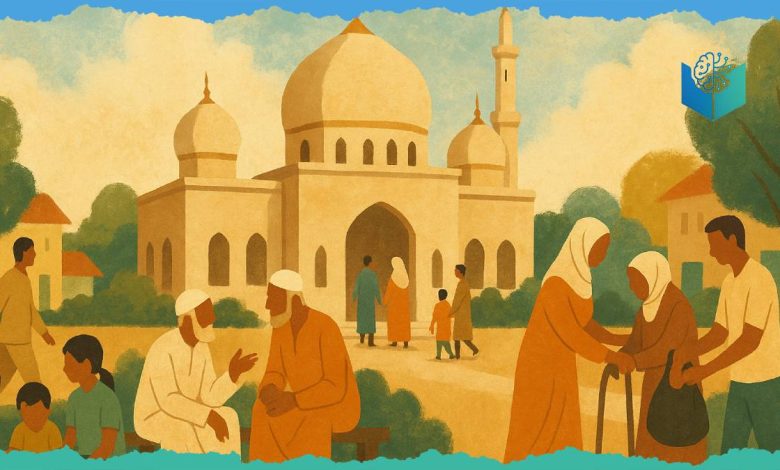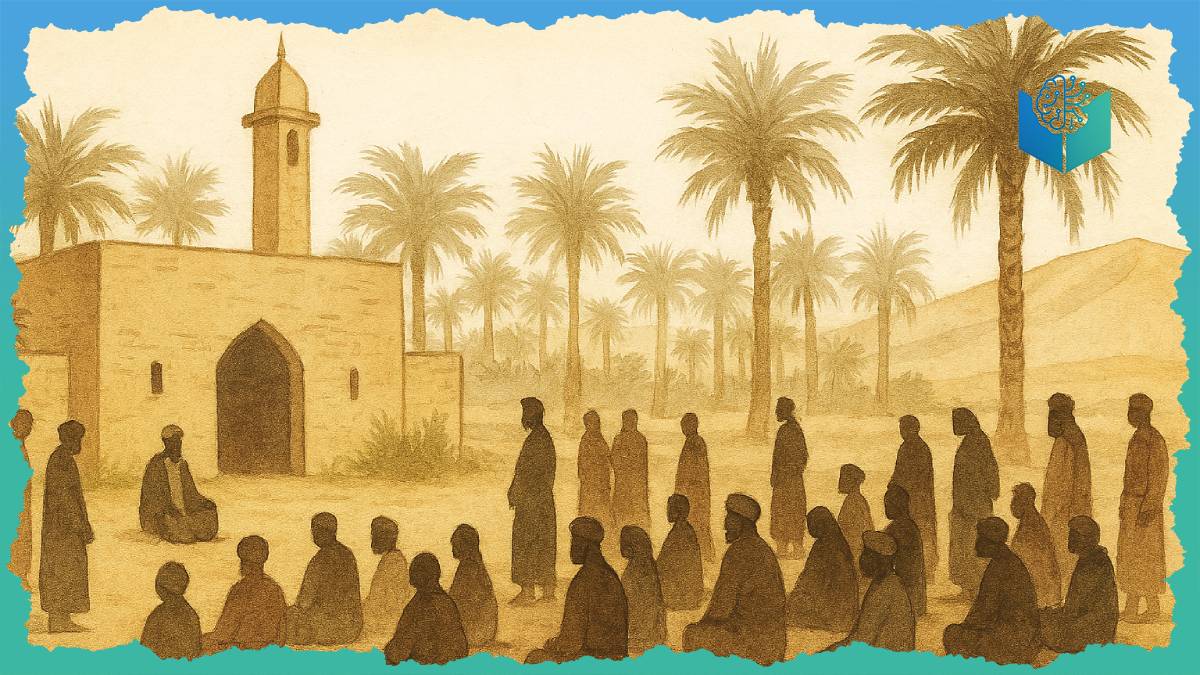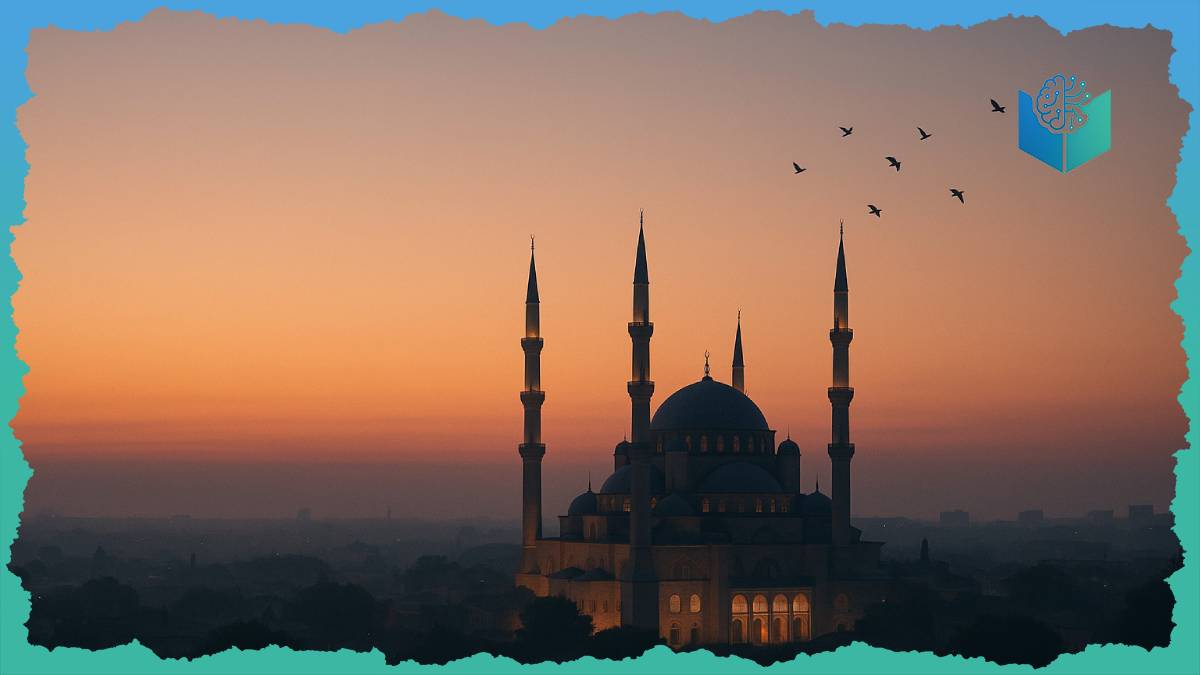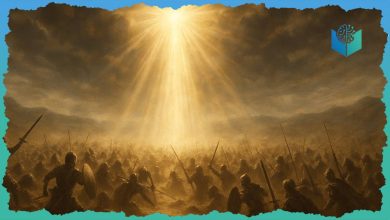The Role of the Masjid

The mosque in Islam is often seen as a sacred space where believers gather for prayer. Yet, within the Quranic worldview, the masjid carries a much deeper and more dynamic meaning. It is not merely a structure of walls and domes; it is the living heart of a community, a center of learning, justice, and unity. Understanding The Role of the Masjid through the lens of the Quran reveals how the first mosques were designed to nurture both spiritual and social well-being.
The word masjid itself comes from the root sajada, meaning “to prostrate.” Thus, a masjid is a place where one humbles oneself before the Creator. But the Quran expands this idea beyond ritual, inviting believers to see the masjid as a hub where hearts and minds align in remembrance, reflection, and service.
The Mosque in Islam: A Symbol of Unity and Submission
The mosque in Islam is not just a location for the five daily prayers; it is the symbolic center of submission to Allah. The Quran states:
“The mosques of Allah are maintained only by those who believe in Allah and the Last Day, and establish prayer and give zakah and fear none but Allah.” (Surah At-Tawbah 9:18)
This verse defines the mosque in Islam as a place maintained by faith-driven individuals who uphold moral responsibility. The act of maintaining a mosque extends beyond cleaning or financing; it includes upholding justice, compassion, and truth within its walls and beyond.
Every believer is equal in the masjid. There is no hierarchy of wealth or status—only sincerity before God. This equality fosters social harmony and eliminates divisions that often appear in worldly spaces.
For readers seeking a deeper understanding of community unity and spiritual purpose, learning about Islam through the Quran’s perspective on the masjid provides a profound foundation.
The Historical Roots: How the First Mosque Shaped Muslim Society
When Prophet Muhammad (peace be upon him) arrived in Madinah, the first action he took was to establish a masjid, Masjid Quba, followed by Masjid an-Nabawi. This historical moment marked the birth of the Muslim community as a social and spiritual organism. The mosque was not limited to prayer; it served as a court, a school, and a place where decisions about justice and welfare were made.
The history of mosques shows that from the earliest times, they functioned as centers of leadership and communication. In the Prophet’s masjid, delegations from different tribes were received, treaties were signed, and the poor were supported. The masjid became the heartbeat of daily life.
This model challenges the modern view that the mosque is only for worship. Instead, the Quran and the Prophet’s practice demonstrate that a true mosque in community life unites believers to serve both God and society.

The Importance of Masjid in the Quranic Perspective
The importance of masjid lies in its purpose to remind people of the Oneness of God and the unity of His creation.
The Quran commands:
“And that the masjids are for Allah, so do not invoke with Allah anyone.” (Surah Al-Jinn 72:18)
This verse makes clear that the masjid is a space purified from worldly power and idolatry. It belongs to Allah alone, and thus, everything that happens within it must reflect His values: truth, fairness, mercy, and wisdom.
Moreover, the importance of the masjid extends to the inner life of believers. It offers a place for reflection, community support, and spiritual growth. Many who come to the masjid find peace, especially when facing life’s hardships. The rhythm of prayer, the sound of recitation, and the sense of belonging all help renew the believer’s sense of purpose.
To explore more Quranic insights like these, platforms such as ayaat.ai help users engage deeply with the meanings of the Quran and its guidance for everyday life.
The Social Role of Mosque: A Center of Compassion and Knowledge
A key element often forgotten is the social role of mosque. In the early Muslim community, the mosque was a space where knowledge was shared, disputes were resolved, and charity was organized. The Quran constantly connects faith with action—belief must be lived through service to others.
The social role of mosque continues to be essential today. Beyond prayers, it can host study circles, community discussions, and charitable programs that uplift the poor and strengthen social bonds. In many places, mosques have also become shelters for travelers and centers for humanitarian outreach.
Allah says:
“Help one another in righteousness and piety, and do not help one another in sin and aggression.” (Surah Al-Ma’idah 5:2)
This verse perfectly reflects the mission of a Quranic masjid, a place where believers cooperate for good and resist injustice together.
The Mosque in Community Life: A Living Heartbeat
The mosque in community is much more than a building for worship; it is the living heartbeat of Muslim life. It gives shape to moral values and provides a collective identity rooted in divine principles. In a world fragmented by individualism, the masjid re-centers the believer within a caring, purposeful community.
When the adhan (call to prayer) echoes through the air, it reminds the entire neighborhood that time belongs to Allah. The masjid thus keeps spiritual consciousness alive in public life. It reminds society that success is not measured by wealth but by righteousness and compassion.
Furthermore, community life around the masjid nurtures intergenerational learning. Elders share wisdom, children learn the Quran, and families bond through faith. This living interaction turns the mosque into a space of renewal and love.
Those who wish to understand how such community dynamics reflect Quranic ethics can explore modern interpretations and resources available about Islam to reconnect the masjid with its original vision.
Masjid Beyond Prayer: Reviving Its True Purpose
A true masjid beyond prayer is not limited to the performance of rituals. It extends its message into every sphere of life, education, art, charity, and justice. The Quran calls believers to live by the remembrance of Allah in all actions, not only in moments of prayer:
“Men who neither trade nor sell are distracted from the remembrance of Allah and the establishment of prayer and the giving of zakah.” (Surah An-Nur 24:37)
This verse beautifully describes how faith integrates with daily life. The masjid serves as the source of that integration. From there, believers return to their homes, workplaces, and streets, carrying the light of faith into society.
Today, many communities are reviving this concept by transforming mosques into inclusive spaces, libraries, educational hubs, counseling centers, and even environmental initiatives. When the masjid beyond prayer becomes active, it mirrors the Quran’s call for a balanced life rooted in worship and service.
To explore digital tools that bring Quranic understanding closer to everyday practice, platforms like ayaat.ai offer valuable resources for reflection and study.
Reviving the Spirit of the Masjid in Modern Times
As modern Muslims, we must ask ourselves: do our mosques reflect the Quranic vision of a living, compassionate community? Too often, the masjid becomes a silent hall rather than a vibrant source of inspiration. Reviving its true role means restoring its connection to the Quran, where knowledge and mercy guide every activity.
Building a strong mosque in community life requires more than architecture—it needs vision. It calls for educators, volunteers, and thinkers who bring the Quran’s light into action. The masjid can become a place where people heal, learn, and serve together under the banner of “La ilaha illa Allah.”
Ultimately, the importance of masjid lies in reminding humanity of its purpose. The Quran says:
“And establish prayer for My remembrance.” (Surah Taha 20:14)
Thus, every prayer, every gathering, and every act of service within the masjid should return us to remembrance of who we are and why we exist.

Conclusion: Returning to the Heart of Worship and Community
The mosque in Islam is more than bricks and carpets; it is the heart of spiritual and social life. The masjid beyond prayer embodies the essence of living about Islam: humility before Allah, compassion toward people, and a commitment to justice.
From the first mosques in Madinah to today’s global Muslim communities, the message remains the same: the masjid is where heaven and earth meet, where worship inspires service, and community reflects divine harmony.
To continue exploring the Quran’s vision for human life, spiritual growth, and community, visit ayaat.ai ; a space dedicated to bringing the meanings of the Quran closer to the heart.
Q&A
What does masjid mean in Islam?
In Islam, masjid means “a place of prostration,” where believers bow in humility before Allah. It serves as a sacred space for worship, reflection, and community gathering.
Why are mosques important in Islam?
Mosques are vital in Islam as centers of prayer, learning, and unity, reminding believers of God’s Oneness and their shared purpose. They nurture both spiritual and social harmony within the community.
What are the 4 types of mosques?
The four main types of mosques include the Jami Mosque (for Friday prayers), Community Mosque, Private/Neighborhood Mosque, and Historic or Regional Mosque that often holds cultural or historical significance.






